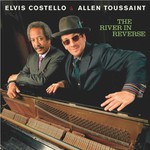The River in Reverse
Studio Album by Elvis Costello & Allen Toussaint released in 2006The River in Reverse review
Elegant, eloquent protest album from Allen Toussaint and Elvis Costello
Some inspired music has arrived in the wake of Hurricane Katrina (mainly on New Orleans-themed benefit albums), but nothing as audaciously ambitious as this cross-generational collaboration between Crescent City mainstay Allen Toussaint and former British upstart turned adventurously eclectic veteran Elvis Costello. As a songwriter, producer, and arranger, Toussaint has been responsible for hits from artists ranging from Irma Thomas, Ernie K-Doe, and Lee Dorsey to the Pointer Sisters and Labelle. He supplies his distinctive piano and horn arrangements – as well as lead vocals on Who's Gonna Help Brother Get Further? – with Costello's Imposters serving as the rhythm section. Toussaint and Costello have collaborated before – Toussaint wrote horn charts for Costello's 1989 album Spike – but neither had plans to work together until they appeared together at several benefit concerts for the victims of Katrina in September of 2005. That kick-started the album that became The River in Reverse. The finished work evolved into an elegant, eloquent protest album that includes seven songs from Toussaint's remarkable catalog; five newly written by the two; and one artful, aching new song written by Costello.
New Orleans R&B and soul staples take on politically charged meaning
The real revelation comes from the new material, including the title track (a searing Costello composition in the Toussaint soul-spiritual mode) and five new Costello/Toussaint compositions that spotlight Toussaint's signature sound without diminishing Costello's creative contributions. Broken Promise Land, Ascension Day, and International Echo explore the aftermath of Katrina. Broken Promise Land drives along on a swampy funk rhythm, the spare and laid-back Ascension Day is a showcase for Allen's piano, International Echo revives the rolling spirit of classic New Orleans R&B, while Six Finger Man has a grinding, gritty blues backbeat. All of these new songs are genuine collaborations, bearing the unmistakable stamp of both highly distinctive musicians, but the best compliment that can be paid to them is that they blend seamlessly with the classic Toussaint songs that comprise the rest of the record. When placed next to explicit songs of protest like Broken Promise Land, such New Orleans R&B and soul staples as On Your Way Down, Tears, Tears and More Tears, Freedom for the Stallion, and especially Who's Gonna Help Brother Get Further? take on an entirely different, politically charged meaning.
A hallmark in the catalog of each artist
Though Costello's band the Imposters form the entirely capable rhythm section (and Steve Nieve is the standout second keyboardist), the dominant sound on The River in Reverse is the familiar sophisticated strut of Toussaint's elegant piano fillips and filigrees. If Costello pushes his phrasing a little harder than most interpreters of Toussaint it suits the spirit of when the album was recorded, and Elvis is balanced about by the earthy, natural sound of the band, and Allen's graceful harmonies. As pure music, this is impossible not to enjoy, and this rich blend of R&B, blues, soul, and funk illustrates exactly how important New Orleans is to America's culture, and that it needs to be embraced in the wake of the disaster of Hurricane Katrina. Ultimately, the greatest achievement of The River in Reverse is that it, like the music of New Orleans itself, cannot be pigeonholed or reduced to one specific thing. It can seem like a party, or it can seem like a bittersweet elegy, which is only appropriate for an album borne out of tragedy but created as a celebration. What could have been a curiosity is instead a hallmark in the catalog of each artist.

